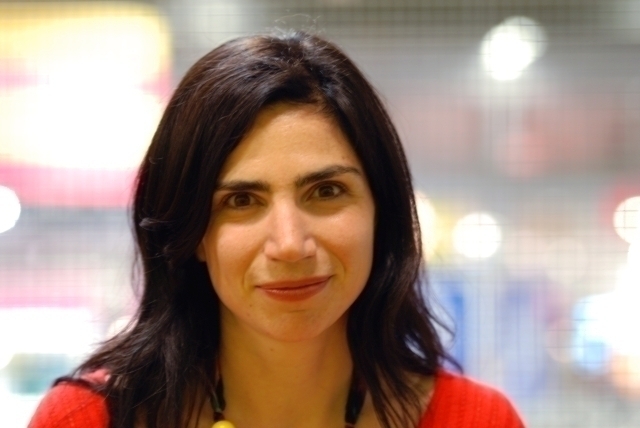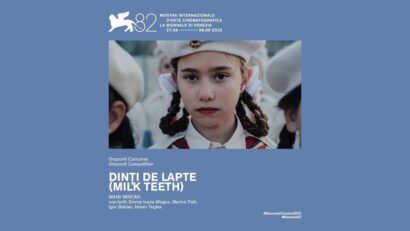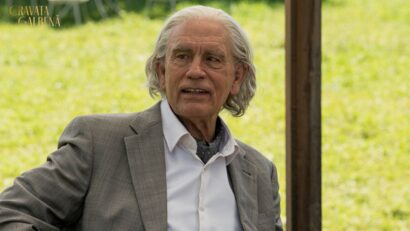Romanian-born writer Dana Grigorcea
Dana Grigorceas award-winning novel in German The Instinctive Feeling of Innocence gets Romanian translation.

Corina Sabău, 28.01.2017, 14:29
The Instinctive Feeling of Innocence is a novel written by Romanian-born writer Dana
Grigorcea. Written in German, the novel was translated into Romanian by Nora
Iuga and Radu-Mihai Alexe and was brought out by the Humanitas Publishers in
Bucharest. The novel won the 3sat Prize granted as part of the 2015 Ingeborg
Bachmann literary contest, also receiving a nomination for the Schweizer
Literaturpreis.
Dana Grigorcea made her debut as a writer of short
fiction in the 1990s, and her works were published in Romania Literara
magazine. Dana Grigorcea read German and Dutch at the University of Bucharest’s
Foreign Languages Faculty. She went on to study theatre and film directing at
Brussels University, then pursued an MA program in journalism at the Danube
University in Krems. Dana Grigorcea worked for ARTE TV station in Strasbourg and
Deutsche Welle radio broadcaster in Bonn. Since 2007, she has been living in
Zurich, where she is teaching film language at the Film Faculty of Zurich’s
University of the Arts. Dana Grigorcea was a guest in literature programs of
the Swiss DRS national radio broadcaster.
Dana Grigorcea and her husband, writer Perikles
Monioudis, organise a literary salon and run a literature blog which can be
accessed at www.neue-telegramme.ch. Dana Grigorcea made her literary debut in
German in 2011 with the novel Baba Rada. Life is Temporary and So is the
Hair on Your Head, for which she won the Literraturperle Swiss Book prize,
as well as honorary mentions awarded by the city of Zurich and thecanton of Zurich.
In the laudatory speech at the awarding ceremony of
the Ingeborg Bachmann Prize, literary
critic Hildegard Keller emphasised the narrative drive of the novel The Instinctive
Feeling of Innocence, as
well as the three perspectives of the narrative, which is told by a feminine self. Keller described the text
as an excellent satire exuding an exuberant vitality. With details on that,
here is the translator of the volume into Romanian, Nora Iuga.
The translator ends
up identifying themselves with the author, since the relationship between the
translator and the author is a relationship which can be closer than the one
between mother and daughter, between sister and brother. And that, because we
speak about a bond secured by language, and there is no element more relevant
than the language, by means of which you can relate to someone. Apart from the
artistry of the style and the expressive qualities of the book, I can say the
title of the book drew my attention, because it was so profound. We need to
ponder on the significance of the title, The Instinctive Feeling of Innocence.
I have repeatedly tried to explain to myself what the relationship was between
the title and the topic of the book, between the title and the author’s look
back on all those years. For her, the most important years she spent in
Bucharest were the buildup years as a human being, but also as a woman. And we
discover, with the help of the book, the kind of place Bucharest was at the
time.
The story is set in
Bucharest in early 2000s. Victoria, fresh from Zurich, witnesses a robbery at
the bank she works for. All of a sudden she is given an unexpected holiday,
having enough time to walk together with her lover or to roam city streets, all
by herself. As she meets old acquaintances from her past, her mind is flooded
by the experiences she had as a child, by the times when she discovered the
world, together with her playmates, in the quiet Cotroceni district. It is a
novel about the Bucharest of yesterday and about the Bucharest of today, about
the final years of the communist regime and the chaotic early days of
capitalism, about the miracles of childhood and about self-search. The
Instinctive Feeling of Innocence
was received with a lot of enthusiasm by the German press. The volume is
impregnated with melancholy humour, as it depicts scenes from a childhood
spent in communist Romania. By constantly switching between narrative levels,
the book makes the transition from a communist childhood to a post-communist
reality. It talks about Michael Jackson’s concert in Bucharest, and then it
switches to a discussion about the sex life of the Ceausescu dictatorial
couple, held by a group of young people on the rooftop of the gigantic People’s
Palace. We have asked Dana Grigorcea if she has noticed any difference in how
her book was received in Romania and Germany:
My reception of the
novel depends very much on the readership. People responded to the book
differently in Germany as they did in Switzerland, for instance. There is a
fragment that I read very often, in which I describe how I was made a pioneer
in communist Romania and reactions are different every time. In the former
Democratic Republic of Germany people have other reactions than the ones in
Dusseldorf or Hamburg, for instance, while the Swiss audience also reacts
differently. There are certain jokes in my novel to which people laugh more in
Switzerland than in Austria. There are certain subtleties that Austrians grasp
faster than the Swiss. So my book heIps me know who my audience is and make an
opinion on them, depending on the place where I read my work.
With the release of the Romanian version of The
Instinctive Feeling of Innocence, readers in Bucharest, Brasov, Timisoara
and Cluj had the opportunity to take part in meetings with Dana Grigorcea, such
as book launches, autograph sessions and public readings, organised by
Humanitas Publishers. The book is due to be translated into English, Dutch and
Bulgarian.






























